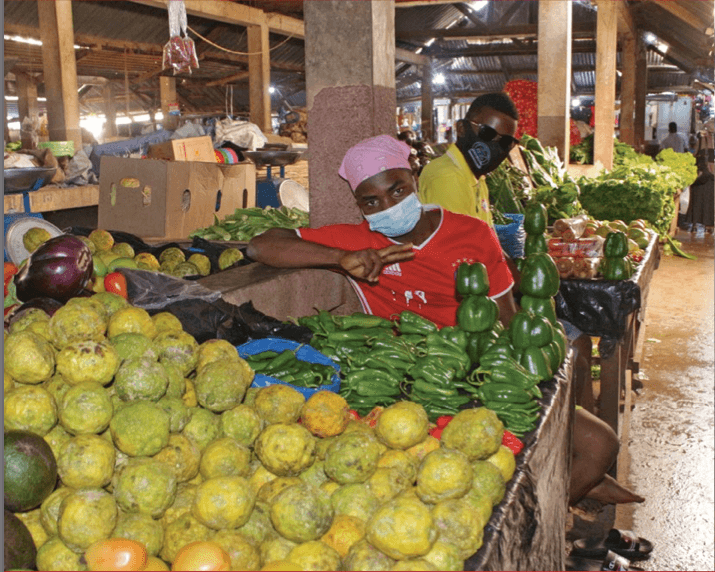The action and its aims
GAIN’s aim was to empower market stakeholders, enhance municipal food policymaking – and, ultimately, ensure the most vulnerable local people had access to nutritious food.The initiative involved in-depth engagement with local stakeholders – who were empowered to co-design food policy options that could address Pemba’s unique set of pandemic challenges and keep local markets working. The results were presented to the local government in the form of a toolkit.
Why was it needed
Food insecurity was widespread in Mozambique before the arrival of COVID-19. In February 2020, the country was estimated to have 1.6 million people living with severe to acute food insecurity and 67.5 thousand acutely malnourished children.1 As the pandemic gained hold, this situation was projected to worsen, with a rapid increase in COVID-19 cases and deaths.2
To contain the spread of the virus, the national government introduced a curfew, mandatory face mask wearing and social distancing. As the pandemic progressed, the economic outlook worsened. Over 80% of Mozambicans reported a decrease in household income.3 Market workers particularly struggled as a result of shorter trading hours and a reduction in stalls in municipal markets, because of social distancing.
Local economic trends in Pemba – the capital of the oil-and-gas-rich Cabo Delgado Province – mirrored national ones. However, the situation was made much worse as Cabo Delgado had been the location of violent anti-government insurgency since 2017. In early 2021, the fighting further north escalated and thousands of families and unaccompanied children4 sought refuge in the city.
The arrival of so many displaced people sent shockwaves through the already precarious local food system. By June 2021, the United Nations stated that more than 900,000 people in Cabo Delgado Province were severely food insecure.5 The chaotic situation also put women and children at risk of gender-based violence and sexual exploitation.
Situated on a peninsula sticking out into the Indian Ocean, Pemba was also rocked by environmental disaster. In 2019, Cyclone Kenneth, the strongest in modern records to hit Mozambique, caused widespread damage to roads, homes, livelihoods and public health.6 Flooding and droughts subsequently marred harvests.
It is in these circumstances that COVID-19 spread. With so many displaced people staying with wider family members in the overcrowded conditions that the virus favours, it quickly became what the Red Cross described as a national ‘epicentre’.7
When was it introduced
In July 2020, planning for the KFMW programme began. Implementation of the policy and coordination workstream started in late September 2020. Final workshops were conducted in November 2021, when the Pemba Policy Options Toolkit became available.
Who initiated it, who is involved
As well as local Mozambican and global GAIN teams, in Pemba the initiative involved market vendors, women vendor groups, market committees and small and medium-sized enterprises linked to traditional urban food markets and county government policymakers.
Impacts to date
The result, to date, is that the toolkit has provided the Pemba city government with a raft of real-world ideas for improving local food policymaking. It outlines market stakeholders’ priorities and linked policy options in ten areas, with the top three as follows:
Dealing with cyclone-damaged market infrastructure was the priority. Policy options included the investigation of public-private partnership funding and the creation of gender-balanced stakeholder teams to co-design new marketplaces.
Market overcrowding was identified as another crucial issue. Workable solutions included helping vendors forced out of markets because of social distancing measures by mapping urban spaces that could be used as temporary market locations, like car parks or schools. Water and sanitation services were the third key challenge. Suggested policies included the appointment of market sanitation and hygiene champions.
Footnotes
- Mozambique I Addressing the impacts of COVID-19 in food crises (fao.org)
- Mozambique: WHO Coronavirus Disease (COVID-19) Dashboard With Vaccination Data | WHO Coronavirus (COVID-19) Dashboard With Vaccination Data
- https://reliefweb.int/sites/reliefweb.int/fi les/resources/mozambique_rga_infographics.pdf
- Horror in Cabo Delgado: Unaccompanied children arrive in Pemba after violence | Save the Children International
- Mozambique_Humanitarian_Response_Dashboard_UptoApril2021_Draft 4.ai (reliefweb.int)
- Cyclones Idai and Kenneth | OCHA (unocha.org)
- Mozambique: Families seek shelter during COVID-19 | ICRC
